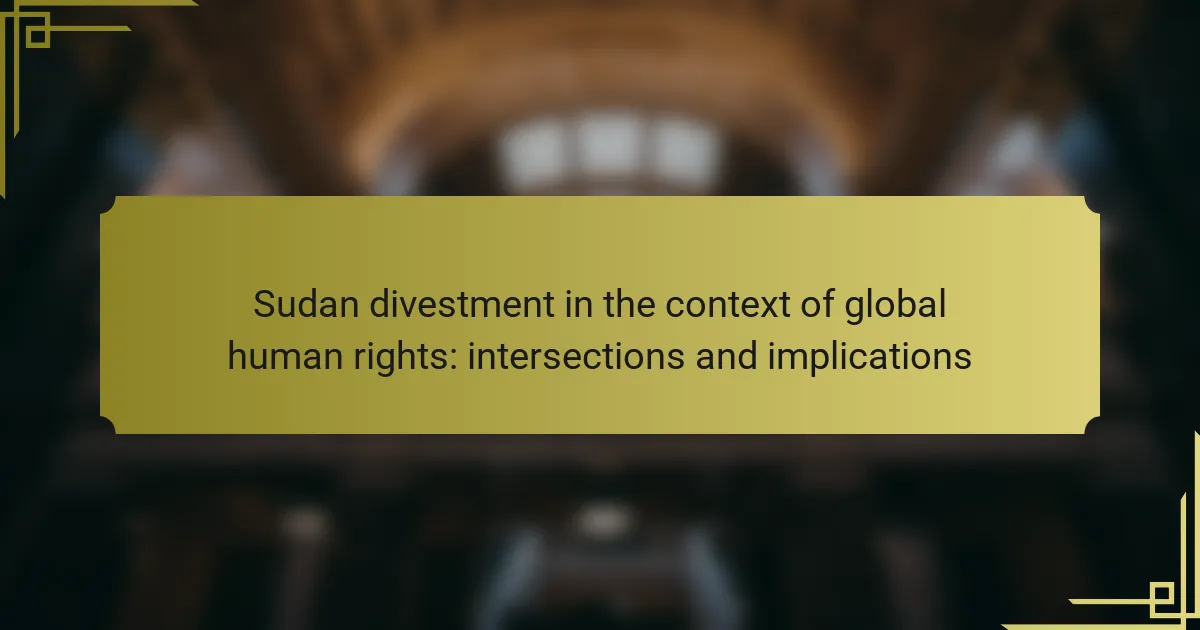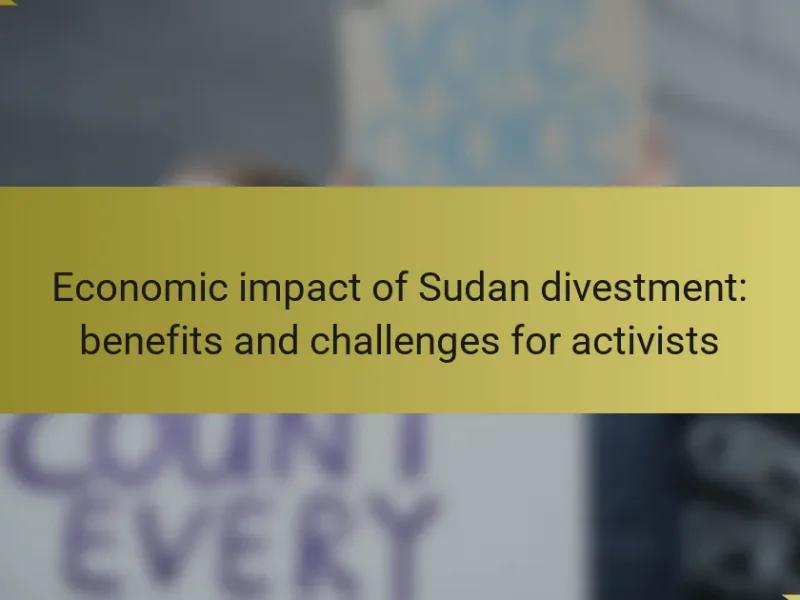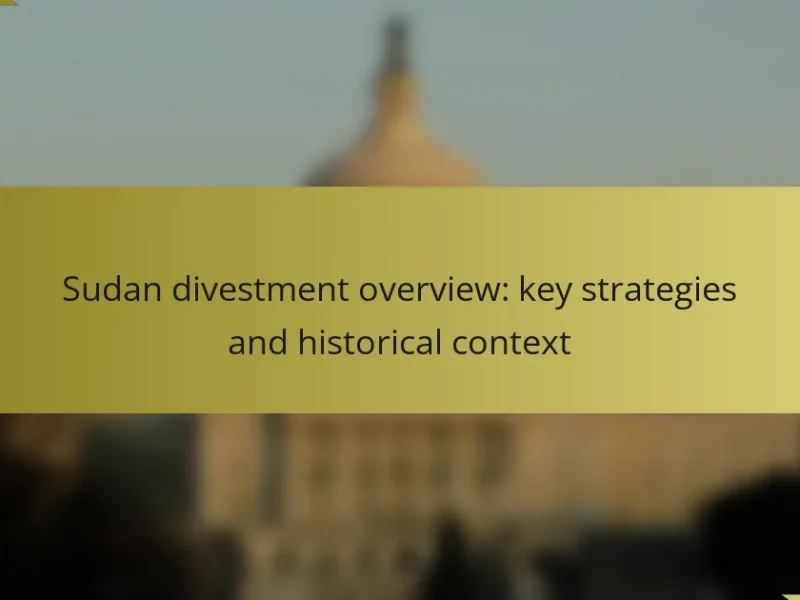Sudan divestment involves the withdrawal of financial investments from companies operating in Sudan due to documented human rights violations, particularly in response to the Darfur conflict. This movement seeks to apply economic pressure on the Sudanese government to enhance its human rights practices and has gained support from various universities and organizations through divestment policies. The article examines how divestment campaigns target companies contributing to human rights abuses, highlighting the potential impact on local communities, including reduced funding for essential services and increased poverty levels. Historical precedents, such as divestment efforts during apartheid in South Africa, are referenced to illustrate the effectiveness of this approach in promoting social justice and ethical investment practices.
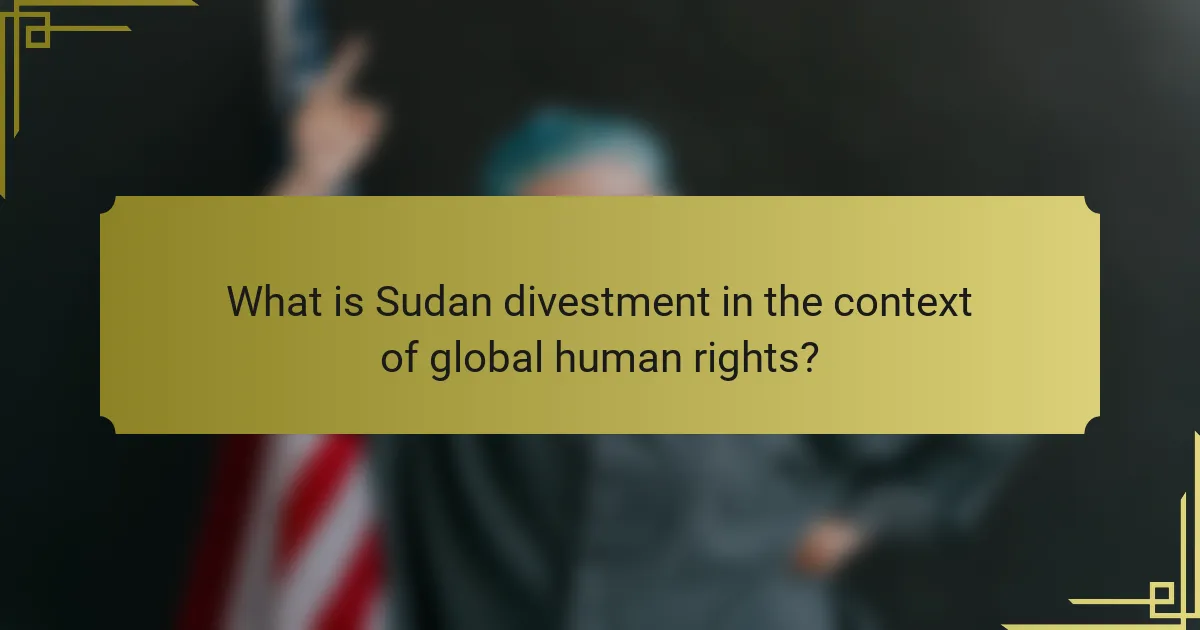
What is Sudan divestment in the context of global human rights?
Sudan divestment refers to the withdrawal of investments from companies operating in Sudan due to human rights violations. This movement gained traction as a response to the Darfur conflict and the Sudanese government’s actions against its own citizens. Activists argue that divestment can pressure the Sudanese government to improve its human rights record. Many universities and organizations adopted divestment policies to align their financial practices with ethical considerations. For example, the Sudan Divestment Task Force was established to encourage institutions to divest from companies profiting from human rights abuses in Sudan. This approach aims to leverage economic influence to promote global human rights standards.
How does Sudan divestment relate to global human rights issues?
Sudan divestment is directly linked to global human rights issues as it aims to pressure the Sudanese government to improve its human rights record. Many investors and organizations choose to divest from Sudan due to ongoing violations, including genocide and ethnic cleansing. This action serves as a form of economic sanctions, signaling disapproval of the government’s actions. Historical instances, such as the Darfur conflict, have highlighted the need for international intervention. Divestment campaigns mobilize public awareness and advocate for accountability. They encourage companies to consider the ethical implications of their investments. By divesting, stakeholders align their financial decisions with human rights principles. This strategy underscores the role of economic power in promoting social justice globally.
What are the key human rights concerns in Sudan?
Key human rights concerns in Sudan include violence against civilians, restrictions on freedom of expression, and lack of accountability for human rights abuses. Armed conflicts have led to widespread displacement and loss of life. The government has imposed severe restrictions on media and public gatherings. Activists and journalists face harassment and imprisonment. Ethnic and religious minorities often experience discrimination and violence. Reports indicate that security forces frequently use excessive force against peaceful protesters. The ongoing conflict in Darfur remains a significant issue, with ongoing reports of atrocities. Human rights organizations continue to call for international intervention and accountability measures.
How does divestment impact these human rights concerns?
Divestment impacts human rights concerns by reducing financial support for entities that violate these rights. When investors withdraw funds, it diminishes the resources available for oppressive regimes. This financial pressure can lead to changes in policies or practices that harm human rights. For example, divestment from companies involved in Sudan’s conflict has historically aimed to curb violence and promote accountability. Research indicates that divestment strategies can raise awareness and mobilize public opinion against human rights abuses. By targeting specific sectors, divestment can create economic consequences that compel change. Thus, divestment serves as a tool for advocating human rights and fostering international pressure on violators.
Why is divestment considered a strategy for promoting human rights?
Divestment is considered a strategy for promoting human rights because it aims to withdraw financial support from entities that violate human rights. This action sends a clear message that such violations are unacceptable. By divesting, organizations and individuals can pressure companies and governments to change their policies. Historical examples include the divestment movement against apartheid in South Africa, which significantly contributed to its end. Additionally, divestment can lead to economic consequences for violators, motivating them to improve their human rights records. Studies show that targeted divestment can effectively influence corporate behavior and government actions. Thus, divestment serves as a powerful tool in the global effort to uphold human rights.
What historical examples support the effectiveness of divestment?
The effectiveness of divestment is supported by several historical examples. One prominent case is the divestment movement against apartheid in South Africa. This movement gained momentum in the 1980s. It involved universities, churches, and cities withdrawing investments from companies operating in South Africa. The divestment campaign raised awareness and applied economic pressure. This pressure contributed to the end of apartheid in 1994.
Another example is the divestment from Sudan during the Darfur conflict. In the early 2000s, activists urged universities and pension funds to divest from companies linked to the Sudanese government. This campaign highlighted human rights abuses and garnered significant public support. As a result, several institutions divested, which pressured the government to address the humanitarian crisis.
Additionally, the divestment from fossil fuels has gained traction in recent years. This movement aims to combat climate change by withdrawing investments from fossil fuel companies. Many universities and organizations have committed to divesting. This collective action aims to shift public policy and corporate behavior towards more sustainable practices.
These examples demonstrate that divestment can effectively influence political and social change.
How do activists view divestment in relation to global human rights advocacy?
Activists view divestment as a crucial strategy for promoting global human rights advocacy. They believe that withdrawing investments from companies involved in human rights abuses pressures those entities to change their practices. This tactic aims to raise awareness of human rights violations and mobilize public opinion against oppressive regimes. For instance, in the context of Sudan, activists have called for divestment from companies linked to the government, which has been accused of genocide and other serious violations. By divesting, activists seek to undermine the financial support that sustains such abuses. Historical examples demonstrate that divestment can lead to significant political and social change, as seen in the anti-apartheid movement in South Africa. Overall, activists see divestment as a powerful tool for accountability and justice in global human rights advocacy.
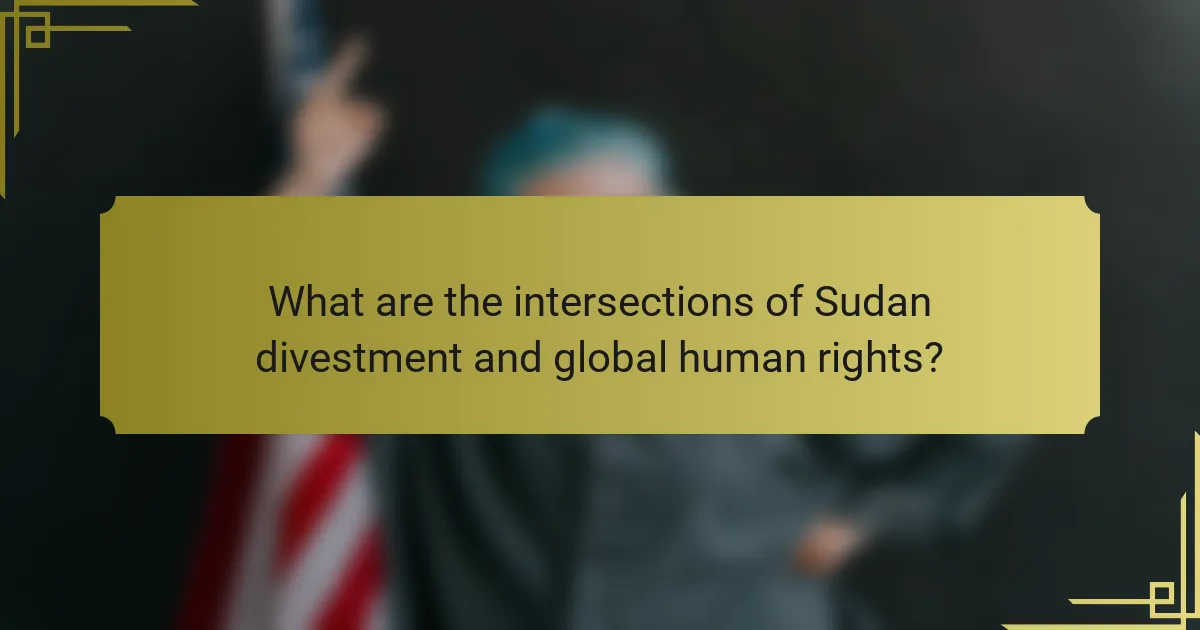
What are the intersections of Sudan divestment and global human rights?
Sudan divestment intersects with global human rights through economic pressure aimed at promoting social justice. Divestment campaigns target companies operating in Sudan that contribute to human rights abuses. These campaigns raise awareness about the Sudanese government’s actions, including violence and oppression against civilians. By withdrawing investments, activists seek to hold these companies accountable. This economic action can lead to policy changes and improved human rights conditions. Historical examples show that divestment has successfully influenced governments and corporations. For instance, divestment from South Africa during apartheid is a notable case. The global human rights framework supports these actions as a means to promote ethical investment practices.
How do economic factors influence human rights in Sudan?
Economic factors significantly influence human rights in Sudan. The country’s economy is heavily reliant on oil exports, which can lead to resource allocation that prioritizes state interests over human rights. Economic instability often results in increased poverty, limiting access to basic services and rights. For instance, inflation rates in Sudan surged to over 300% in 2021, exacerbating living conditions. This economic strain can lead to civil unrest, further jeopardizing human rights as the government may respond with repression. Additionally, foreign investment can shape human rights practices; companies that ignore labor rights contribute to violations. Reports indicate that economic sanctions can also pressure governments to improve human rights conditions, as seen in various global contexts. Therefore, the interplay between economic factors and human rights in Sudan is complex and critical.
What role do foreign investments play in Sudan’s human rights landscape?
Foreign investments significantly impact Sudan’s human rights landscape. They can either promote economic development or exacerbate human rights abuses. For instance, investments in sectors like oil and mining often lead to displacement of communities. This displacement frequently occurs without proper compensation or consent. Additionally, foreign companies may engage with local governments that have poor human rights records. This engagement can contribute to ongoing violations, such as suppression of dissent and lack of labor rights. Some foreign investments have been linked to funding security forces implicated in human rights abuses. Therefore, the nature of foreign investments is crucial in determining their effects on human rights in Sudan.
How can divestment alter the economic dynamics in Sudan?
Divestment can significantly alter the economic dynamics in Sudan by reducing foreign investment and financial support. When investors withdraw their capital, it leads to decreased economic activity. This withdrawal can result in job losses and reduced government revenue. Consequently, essential services like healthcare and education may suffer. Historical data shows that divestment campaigns have previously impacted economies by isolating regimes. For instance, divestment from South Africa during apartheid contributed to economic pressure that led to political change. Thus, divestment in Sudan could create similar economic pressures that might influence governance and human rights practices.
What implications does Sudan divestment have on international relations?
Sudan divestment significantly impacts international relations by altering diplomatic and economic ties. It serves as a tool for countries and organizations to express disapproval of Sudan’s human rights violations. This action can lead to increased isolation of the Sudanese government on the global stage. Countries that divest may strengthen alliances with nations advocating for human rights. Additionally, divestment can pressure the Sudanese regime to change its policies. Historical examples include the divestment movements against apartheid in South Africa, which successfully influenced international policy. The cumulative effect of such actions creates a ripple effect in global human rights advocacy.
How do countries respond to divestment movements in Sudan?
Countries respond to divestment movements in Sudan through various diplomatic and economic actions. Many nations support divestment as a means to pressure the Sudanese government regarding human rights abuses. For instance, the United States has implemented sanctions targeting individuals and entities linked to the Sudanese regime. These sanctions often coincide with calls for divestment from companies operating in Sudan. European countries have similarly encouraged businesses to withdraw investments from Sudan to promote accountability. Furthermore, international organizations advocate for divestment as a strategy to influence change in Sudan’s policies. The effectiveness of these responses varies, with some countries seeing tangible results while others face challenges.
What are the potential geopolitical consequences of divestment?
Divestment can lead to significant geopolitical consequences, particularly in regions like Sudan. It may weaken the economic stability of the targeted nation. Reduced foreign investment can exacerbate existing political tensions. This situation can create power vacuums, allowing extremist groups to gain influence. Additionally, divestment can shift alliances, as nations may seek new partnerships to replace lost economic ties. Historical examples show that divestment movements have altered government policies. For instance, divestment from South Africa during apartheid contributed to international pressure for change. Thus, the geopolitical landscape can shift dramatically as a result of divestment actions.
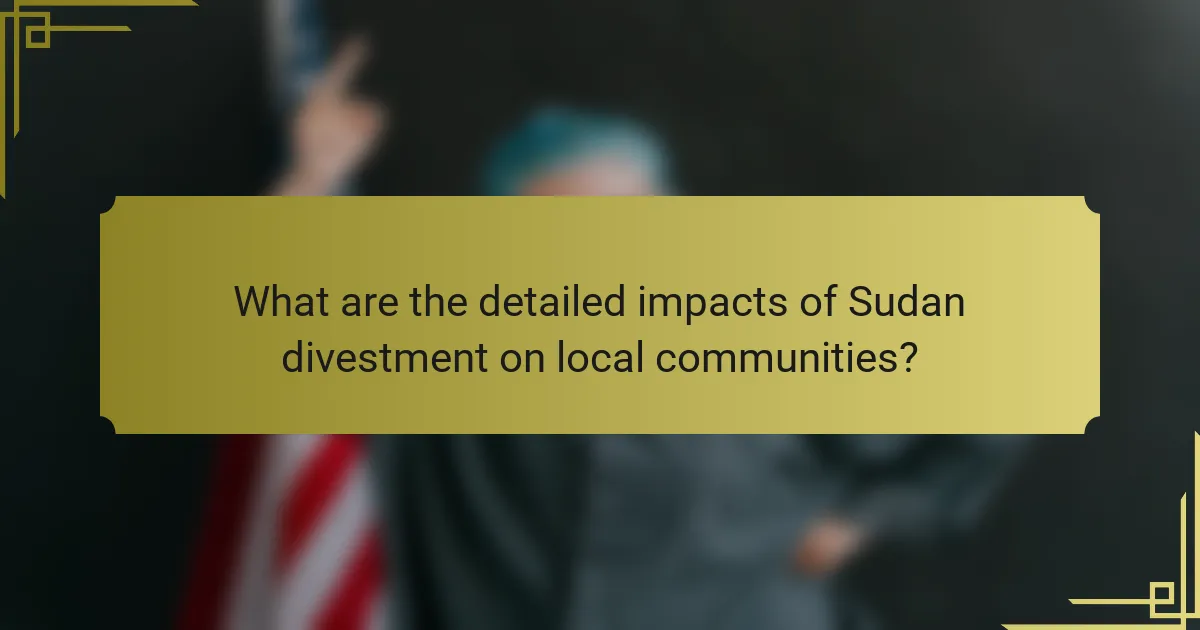
What are the detailed impacts of Sudan divestment on local communities?
Sudan divestment has significant impacts on local communities. It often leads to reduced funding for essential services. This includes healthcare, education, and infrastructure. Local economies may suffer due to decreased investment. Job losses can occur as businesses face financial instability. Furthermore, the lack of resources can exacerbate poverty levels. Humanitarian aid may also decline, affecting vulnerable populations. These factors collectively undermine community resilience and stability.
How does divestment affect the livelihoods of Sudanese citizens?
Divestment negatively impacts the livelihoods of Sudanese citizens by reducing foreign investment and economic opportunities. As companies withdraw, job losses and decreased economic activity follow. This leads to higher unemployment rates and lower household incomes. Essential services like healthcare and education may also suffer due to reduced funding. A 2021 report by the World Bank indicated that divestment could lead to a 15% decline in GDP. This economic contraction directly affects citizens’ quality of life and access to basic needs. Overall, divestment creates a cycle of poverty and instability within Sudan.
What sectors are most impacted by divestment in Sudan?
The sectors most impacted by divestment in Sudan include oil, mining, and telecommunications. The oil sector is crucial as it generates significant revenue for the government. Mining activities, particularly gold extraction, have also seen substantial investment. Telecommunications companies face challenges due to international sanctions. Agriculture, while less directly impacted, suffers from reduced foreign investment. The overall economic landscape is affected by these divestments, leading to increased unemployment and instability.
How do local communities react to divestment initiatives?
Local communities often react to divestment initiatives with a mix of support and opposition. Support typically arises from communities that view divestment as a means to pressure governments or corporations to change harmful practices. For example, in Sudan, local advocacy groups have endorsed divestment as a strategy to address human rights abuses. Conversely, some communities may oppose divestment due to concerns about economic impacts. They fear job losses or reduced investment in local services. The reaction can also be influenced by the perceived effectiveness of divestment in achieving desired outcomes. Studies have shown that community engagement is crucial for successful divestment campaigns. This highlights the importance of dialogue between stakeholders to address concerns and foster support.
What strategies can be employed to enhance the effectiveness of divestment?
Strategic engagement with stakeholders enhances the effectiveness of divestment. Building coalitions with human rights organizations amplifies advocacy efforts. Targeting specific companies linked to human rights abuses increases pressure for change. Utilizing social media campaigns raises public awareness and mobilizes support. Implementing shareholder resolutions can influence corporate behavior. Conducting thorough research on targeted entities ensures informed decision-making. Monitoring and reporting on divestment outcomes holds stakeholders accountable. Collaborating with legal experts can strengthen the case for divestment actions. These strategies collectively create a robust framework for effective divestment in the context of Sudan’s human rights issues.
What role do international organizations play in supporting divestment?
International organizations play a crucial role in supporting divestment by promoting policies that encourage financial withdrawal from entities involved in human rights violations. They provide frameworks and guidelines that help investors understand the ethical implications of their investments. Organizations like the United Nations and Amnesty International advocate for divestment as a means to pressure governments and corporations to change harmful practices. They often publish reports detailing human rights abuses, which serve as evidence for investors to justify divestment decisions. Additionally, international organizations facilitate dialogue among stakeholders, raising awareness about the impacts of investment in conflict zones like Sudan. Their efforts can lead to collective actions, amplifying the divestment movement and increasing its effectiveness.
How can grassroots movements amplify the impact of divestment?
Grassroots movements can amplify the impact of divestment by mobilizing community support and raising awareness. They create a collective voice that pressures institutions to divest from unethical practices. Grassroots efforts often highlight the human rights violations linked to investments. Their campaigns can lead to increased public scrutiny of companies involved. This heightened visibility can influence consumer behavior and investor decisions. For example, successful grassroots campaigns have led to significant divestment actions in various sectors. Studies show that public pressure can lead to substantial financial losses for targeted companies. By fostering solidarity, grassroots movements can drive policy changes that reinforce divestment goals.
What best practices should be considered for effective Sudan divestment?
Effective Sudan divestment requires a strategic approach. Investors should conduct thorough research on companies operating in Sudan. This includes understanding their involvement in human rights violations. Engaging with stakeholders is crucial. Investors must communicate with affected communities and human rights organizations. Establishing clear divestment criteria is essential. This should include specific human rights benchmarks. Monitoring and reporting on divestment progress enhances accountability. Transparency in the divestment process builds trust. Collaboration with other investors can amplify impact. These best practices ensure that divestment efforts are meaningful and effective.
Sudan divestment refers to the withdrawal of investments from companies operating in Sudan due to human rights violations, particularly in response to the Darfur conflict. This movement aims to pressure the Sudanese government to improve its human rights record through economic influence, as seen in historical examples like the anti-apartheid divestment. Key human rights concerns in Sudan include violence against civilians, restrictions on freedom of expression, and lack of accountability for abuses. The article explores the intersections of divestment and global human rights advocacy, the impacts on local communities and economies, and strategies for enhancing the effectiveness of divestment initiatives. It also discusses the role of international organizations and grassroots movements in supporting these efforts.
